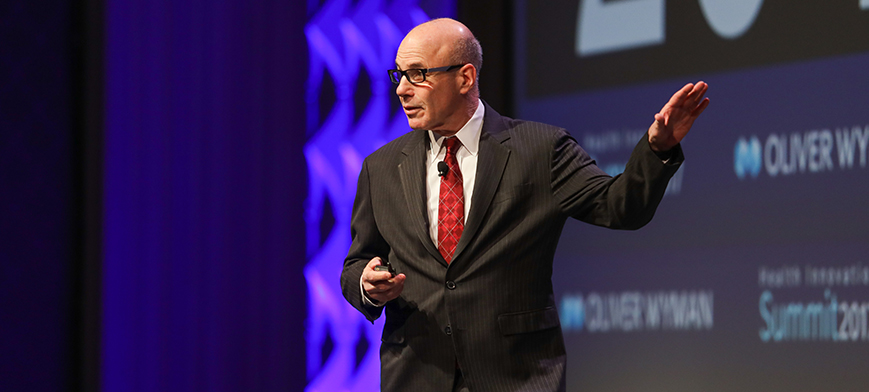Hundreds of senior healthcare executives and leaders came together in Dallas from November 6-8 for the fifth annual Oliver Wyman Health Innovation Summit. The theme of this year’s event was “Industry Interrupted: Delivering on the Promise of Change.” Here is a recap of what those leading the Summit’s closing Main Stage Sessions had to say about disruption in the healthcare industry. (The next Oliver Wyman Health Innovation Summit will be November 5-7, 2018 in Dallas, Texas.)
Stephen Klasko, MD, MBA, President & CEO, Thomas Jefferson University and Jefferson Health, kicked off one of two Wednesday morning sessions – What Got Us Here Won’t Get Us There: The Clinicians We Need Now – by discussing smartphones, Millennials, and medical education.
“Technology will replace 80 percent of what doctors do. Any doctor that can be replaced by a robot probably should be,” said Stephen. “Seventy percent of physicians practicing three years or less felt they did not learn what they need most in practice,” he added.
“It’s not just Millennials who are going to change things. What about the folks who don’t use their iPhones?” he asked. “The ‘see one, do one, teach one’ philosophy of medical education does not work if you’re the one on the other side of the table,” he emphasized.
Next to take the stage, Paul B. Rothman, MD, Dean of School of Medicine and CEO at Hopkins Medicine, reflected on the physician landscape during a session called Delivering on the Promise of 21st-Century data to Benefit Patients.
“I’m not sure doctors will be replaced over the next five or ten years,” Paul told attendees. “Diseases are different in different people. If you don’t understand that, you will not succeed in treating that person,” he said, adding that maybe two of three patients respond to a prescribed drug in the first place.
“Today, revolutions in measurement, data analysis, and connectivity bring a whole new set of possibilities to clinicians and investigators,” Paul continued. “Moving forward, there is potential to revolutionize the diagnosis, prevention, and treatment of illness as we build a learning health system.”
The Summit’s afternoon sessions included a discussion titled Market Makers (or Market Shakers?): A Chat on How the Ecosystem Will Evolve, led by Chris Cigarran, CEO of Imagine Health, and Debra A. Gold, Senior Vice President of Quantum Health. Chris and Debra discussed healthcare consumerism and insurance challenges and opportunities.
“If you want to focus on making change in healthcare, you’ve got to focus on where cost happens,” Chris stated. “Cost happens where care happens,” he emphasized.
“It’s about that unchosen healthcare journey. It’s our responsibility to take it further,” added Debra. “Everybody is trying to build the same thing,” she noted, adding that creating meaningful innovation goes well beyond merely creating something that does not already exist.
At one of Wednesday’s afternoon sessions – Looking Back to Look Ahead: Where Do We Go From Here? – led by Niyum Gandhi, Executive Vice President & Chief Population Health Officer at Mount Sinai Health System, Todd Van Tol, Senior Vice President of Health Plan Business at Blue Cross Blue Shield of Michigan, and Michael Weissel, Optum’s Group Executive Vice President, key topics of discussion included population health, artificial intelligence, and healthcare’s accessibility.
“Population health used to be the most overused term in healthcare,” said Niyum on the current state of the industry. “What’s broken in our industry is that the consumer and customer are different. In other industries, they are more aligned. If you think about value, you need to improve value for both the consumer and the customer paying the bills to be successful.”
“We want to move towards where we use artificial intelligence and machine learning to identify patients most likely to be impacted by the interventions and identify what type of interventions have the best impacts in what types of patients,” he stressed. “Just because a patient is high cost doesn’t mean we should be spending all our resources on them.”
“If we looked at each person as a profit pool, we would have made different decisions,” added Todd. “We can’t fix healthcare in a vacuum.”
“I would be happy if as an industry we could have a mature discussion and have the right debate and dialogue about what access to healthcare means, how much we will pay for it, and how we will deliver it,” he said, reflecting on his vision for an ideal healthcare industry.
Concluded Michael, “I get most excited about how we can get consumers actively engaged in their own health. At the end of the day, a person has to change their behavior to make a difference in the healthcare system.”
